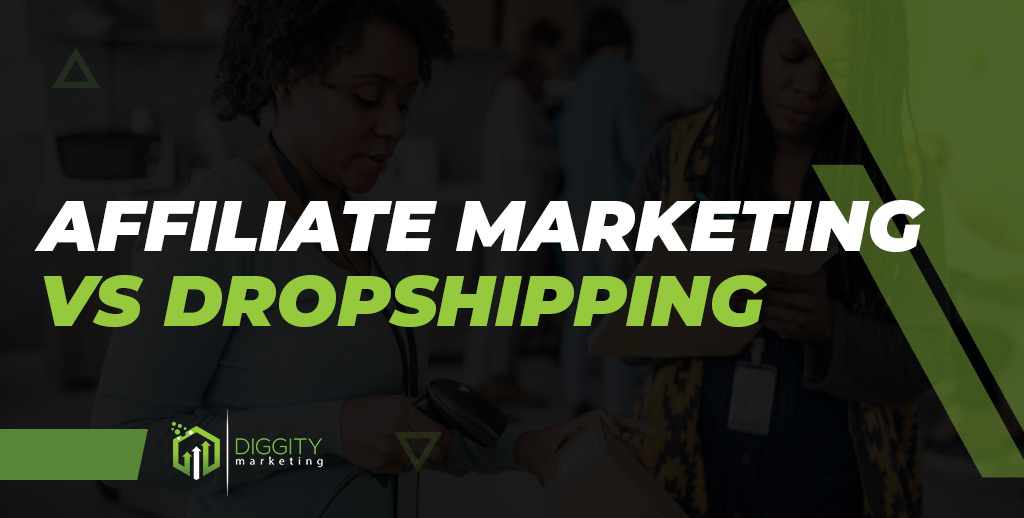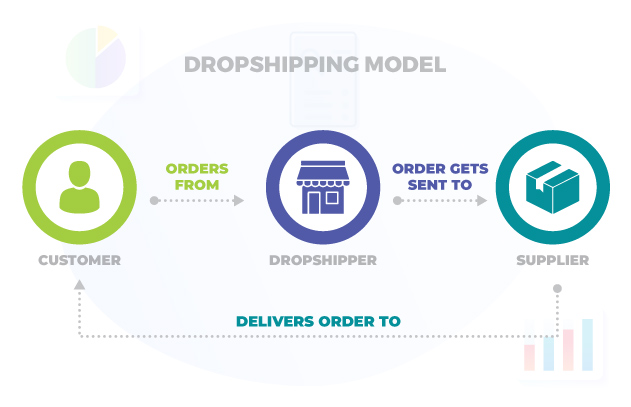There are many options for people to start earning online. Two very popular business models include dropshipping and affiliate marketing.
Both come with their own advantages and disadvantages and are different and similar in many ways.
Dropshipping is a good option for anyone wanting to have a low-risk eCommerce store. Affiliate marketing is a great way to monetize your blog or niche-specific website.
If you’re trying to work out whether to become an affiliate, drop shipper or both, this article is for you. We’ve done many hours of research and have years of experience.
In this article, we will cover everything you need to know about these business models here.
Table Of Contents
- What Is A Dropshipping Business?
- How Does Dropshipping Work?
- Dropshipping Pros
- Dropshipping Cons
- What Is Affiliate Marketing?
- How Does Affiliate Marketing Work?
- Affiliate Marketing Business Pros
- Affiliate Marketing Business Cons
- Affiliate Marketing Versus Dropshipping – Differences And Similarities
- Affiliate Marketing Vs Dropshipping – Which Is Better?
- Frequently Asked Questions (FAQs)
- Concluding Thoughts
What Is A Dropshipping Business?
Dropshipping is having your own business but without having to keep stock on hand. And with the dropshipping business model, you don’t need to handle the shipping of orders.
Put differently, dropshipping is when a manufacturer keeps the stock and handles your orders.
All you need to do is to market the products and get sales. Everything else is handled for you.
How Does Dropshipping Work?
This is an eCommerce business model that allows you to sell products as if they are your own.
You are responsible for marketing the products and creating your own brand. It’s a low-risk approach to running an online business and a fair way to make a profit.
As a dropshipping marketer, you pay the wholesale price for the products on a per-order basis.
You then set your own price, which the customer pays, and whatever profit you make is yours.
Dropshipping Pros
Being a dropshipping marketer comes with some great benefits. We’ll discuss them here.
Broad Product Selection
One of the huge benefits of dropshipping is that it gives business owners a large variety of products to promote.
It’s Easy To Start Up
Starting up a dropshipping business involves simple steps as opposed to setting up a brick and mortar business that requires inventory, staff, setting up of a physical store, etc.
Your biggest priority is to set up a dropshipping website that you can use to market the products and sell them.
Websites can be set up fairly quickly with the right skills or help from a developer.
You Have More Opportunities To Earn
The product selection is limitless when you’re a dropshipping marketer.
You can choose to market a much wider range of products compared to affiliate marketing. And you can set your own prices.
It’s Easy To Scale Your Dropshipping Business
You can decide how big or small your want your business to be and scale it according to your marketing capacity. This means you can start off small and as your income grows, you can invest more money into intelligent marketing strategies.
You Set Your Own Product Prices
As a dropshipping marketer, one of the biggest upsides is that you can choose your own product prices.
And if you are smart about choosing your wholesalers or suppliers, you can set your selling price and ensure that you make a decent amount of profit on the products you sell.
You Have No Barriers To Entry
When it comes to being an affiliate, some of the affiliate programs you apply to will have requirements and conditions that you need to meet.
With drop shipping, you don’t have to deal with these conditions and you can set your own terms.
And as the store owner, you decide exactly how you want to start your business up and run it.
Dropshipping Cons
There are also a few downsides to being a dropshipping marketer, as is the case with any business model. We’ll deep dive into these here.
You Have Less Control Over The Shipping Process
With a dropshipping business, you don’t have control over the shipping process which can be very frustrating at times.
You are also responsible for customer service, so it’s not always easy to maintain customer satisfaction if you can’t control shipping.
You Have To Rely On Others For Stock
Because you don’t keep stock on hand with a dropshipping business, you depend on manufacturers or suppliers who do.
This means that there can be delays when it comes to having your customers’ orders filled.
You Are Solely Responsible For Marketing Your Dropshipping Business
This means that your success as a dropshipping business owner depends solely on your marketing efforts and expertise.
You are responsible for starting a dropshipping website to market your business and create quality content to bring in traffic.
The higher the quality of your website or online store, and the more marketing strategies you invest in, the more successful you’ll be.
You Have To Provide Customer Support
This online business model requires you to provide customer service, unlike affiliate marketing. This can be time-consuming and also requires a lot of patience.
What Is Affiliate Marketing?
The affiliate marketing model is different from dropshipping.
Instead of purchasing products from a wholesaler and then selling them at your own price as your own products, affiliate marketing means selling other companies’ products on their behalf and making a commission on each sale you make.
How Does Affiliate Marketing Work?
As an affiliate marketer, you set up your own website according to your niche of choice.
You then join affiliate marketing programs, such as CJ Affiliate. You pick products that they sell that are in line with your niche.
Affiliate Marketing Business Pros
Let’s take a look at some of the pros of becoming an affiliate marketer.
Your Order Fulfillment Costs Are Low
As is the case with dropshipping, affiliates don’t need to invest time and money to keep an inventory of stock. They’re simply marketing products at another business’s retail price and making a commission off of the sales.
You Don’t Have To Manage Inventory
With no need to stock products on hand, affiliate marketers don’t need to worry about inventory management.
As an affiliate, this helps you to spend time and money on other areas like improving the quality of your website and marketing strategies to increase your traffic.
You Don’t Need To Provide Customer Support
One of the bonuses of taking the affiliate marketing route is that you are not responsible for providing customer support. This is all done by the company that you’re an affiliate for.
You Can Earn Passive Income
Having an affiliate marketing website is generally low maintenance after you get it off the ground and running.
You won’t need to constantly handle everyday business functions like with other more traditional business models such as opening a restaurant.
As long as your website is set up well and you have marketing strategies in place, this is a great business model to earn passive income.
Affiliate Marketing Business Cons
When it comes to being an affiliate marketer, there are some downsides. Let’s jump into them here.
Your Earnings Are Strictly Commission Based
As an affiliate, you only earn through commission. The other downside about this is that depending on the affiliate program you join, commissions on certain products can be low.
You need to work strategically as an affiliate to promote products within your niche with good earning potential.
You Have To Rely On Cookies
When a customer clicks on your affiliate link, a cookie is added to their browser. They need to purchase the product that you’re promoting through this link within a specific time frame for you to be eligible for the commission.
The downside is that many of these affiliate programs give a maximum of 7 days for the customer to make a purchase and thereby provide you with a commission.
You Can Experience Delays In Payments
When you’re an affiliate, you have to agree to the terms and conditions set out by the affiliate program you’re joining. For some, payments happen at the end of every month and start with a 60-day waiting period.
You Can’t Use Affiliate Marketing To Brand Your Own Business
You can’t market products as your own with affiliate marketing.
You Can’t Include Affiliate Links In Offline Marketing Strategies
Most affiliate programs don’t allow you to use offline marketing strategies like direct mail to market their products.
This can limit your options when it comes to marketing your affiliate links. In many cases, you’ll need to rely solely on SEO and online strategies to increase traffic to your website.
Affiliate Marketing Versus Dropshipping – Differences And Similarities
To decide which is the better business model to choose, you may also want to look at the similarities and differences between the two.
Affiliate And Dropshipping Similarities
Marketing approaches: Both affiliates and drop shippers need to focus on marketing strategies for their online stores.
One of the best ways to do this is to increase traffic through SEO strategies and other online marketing tools like Google ads.
Low-risk business models: Both dropshipping and affiliate marketing are low-risk businesses that work by setting up eCommerce stores or niche websites.
There’s no need to purchase and keep stock in inventory, so there’s less risk when it comes to both when it comes to potential profit loss.
Low-start-up cost: The only real cost involved for both dropshipping and affiliates is the website start-up cost.
This is a lot more affordable than the cost required to start up a business using the traditional business model.
There’s no need to hire staff, rent a building or office space, purchase bulk amounts of stock or pay for amenities.
No need to keep stock inventory: Both dropshipping and affiliate marketing rely solely on online sales. Neither requires you to carry your own stock.
Affiliates simply promote another business’s products. And drop shippers sell products from wholesalers or suppliers on a per order basis.
Requires you to have a website: Affiliates need an affiliate website and drop shippers need a dropshipping website or eCommerce website. Both rely heavily on having a well-functioning and well-designed website.
With affiliate marketing, you usually have a niche that you post content about and join affiliate programs that allow you to create links. You’ll create links to market products related to your niche.
Dropshipping is like having your own business, just online and you don’t need to handle the shipping part of things. It is, therefore, a little more important to design a high-quality online store that is likely to secure your customers’ trust.
Affiliate And Dropshipping Differences
Marketing approaches: Affiliate marketers are more restricted when it comes to their marketing options.
That’s because they often cannot use offline marketing strategies to market affiliate links. One of these being direct mail marketing.
Whereas drop shippers can use any online marketing strategy to promote their dropshipping business.
This means that affiliates may need to spend a little more on marketing costs to increase their SEO and improve their ranking on Google.
Branding: Dropshippers can create their own brand for the products they sell and sell these as their own.
Affiliates on the other hand, need to explicitly state that they are not marketing their own profits and get a percentage for their sales.
Income model: Affiliates get paid by the companies whose products they promote using affiliate links. This means they can expect delays in payments.
Dropshippers purchase products per order from their chosen suppliers, sell these products at their own prices and then they take the selling price minus the cost price and make an income.
This means they don’t rely on another company to pay them. They are responsible for their own income.
Earning methods and potential: Since drop shippers have more control over their pricing, they tend to have the upper hand when it comes to earning potential. Affiliates only earn commission on the products they sell.
With that being said, earning potential also depends on your marketing efforts and how much you invest in your business.
You can make either a lucrative option using the correct strategies.
Affiliate Marketing Vs Dropshipping – Which Is Better?
The answer to this really depends on your wants and needs.
Dropshipping is for you if you want to market and brand your own business, you have the time and capacity to invest in an online store and you’re comfortable with handling customer queries.
Affiliate marketing is more for you if you’re looking for a more passive way to make income and are more invested in your blog or website for different purposes.
This way you can simply promote other products without having to deal with any customer queries.
Frequently Asked Questions (FAQs)
Is Dropshipping Better Than Affiliate Marketing?
Both are low-risk, low-cost startups with their own advantages and disadvantages.
Can You Combine Affiliate Marketing With Dropshipping?
Yes, you can combine both to increase your passive income and earning potential. This model requires a more hands on approach and attention to your customers’ needs.
What Is Better Than Dropshipping?
Drop shipping is considered to be a better alternative to dropshipping. It’s similar to dropshipping, only it involves heavy market research to buy products from suppliers who offer the best price.
This way you can put a higher mark-up on products to increase your profit margins.
Concluding Thoughts
At first, both dropshipping and affiliate marketing seem similar, they are actually quite different in their business models. Dropshipping involves setting up an online store and starting a brandable business.
Affiliate marketing depends on a fully functioning website or blog that you can use to post affiliate links to sell products.
These differences will determine the best approach for you according to your wants and needs as well as your capacity and marketing abilities.
If you’re interested in getting started as an affiliate, check out our free affiliate marketing webinar.























